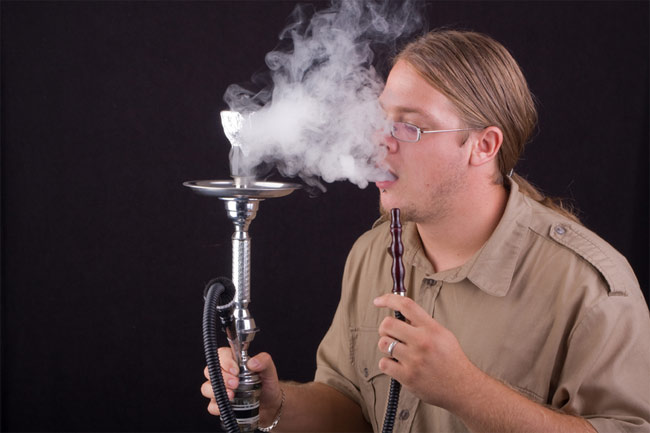Hookah Smoke Contains Cancer-Causing Chemical

Get the world’s most fascinating discoveries delivered straight to your inbox.
You are now subscribed
Your newsletter sign-up was successful
Want to add more newsletters?

Delivered Daily
Daily Newsletter
Sign up for the latest discoveries, groundbreaking research and fascinating breakthroughs that impact you and the wider world direct to your inbox.

Once a week
Life's Little Mysteries
Feed your curiosity with an exclusive mystery every week, solved with science and delivered direct to your inbox before it's seen anywhere else.

Once a week
How It Works
Sign up to our free science & technology newsletter for your weekly fix of fascinating articles, quick quizzes, amazing images, and more

Delivered daily
Space.com Newsletter
Breaking space news, the latest updates on rocket launches, skywatching events and more!

Once a month
Watch This Space
Sign up to our monthly entertainment newsletter to keep up with all our coverage of the latest sci-fi and space movies, tv shows, games and books.

Once a week
Night Sky This Week
Discover this week's must-see night sky events, moon phases, and stunning astrophotos. Sign up for our skywatching newsletter and explore the universe with us!
Join the club
Get full access to premium articles, exclusive features and a growing list of member rewards.
People who smoke a hookah or inhale secondhand hookah smoke may be breathing in the chemical benzene, a substance that previous research has linked with an increased risk of leukemia, according to a new study.
In the study, researchers collected urine samples from 105 hookah smokers before and after they smoked from a hookah, a pipe that's used to smoke flavored tobacco. They also collected urine samples from 103 people who didn't smoke hookah tobacco but attended events where they'd be exposed to hookah smoke, to test the effect of secondhand hookah smoke on these people's bodies.
The researchers found that urine levels of a compound called S-phenylmercapturic acid (SPMA), which forms when benzene is broken down in the body, increased more than fourfold in the hookah smokers who smoked at a hookah lounge, and increased almost twofold in the people who smoked hookah tobacco at home.
Moreover, levels of SPMA in the urine of people who were at a hookah lounge but hadn't smoked were 2.6 times higher after they were exposed to the hookah smoke in lounges. [Krokodil, Molly and More: 5 Wretched New Street Drugs]
"This is the first study to find higher exposures to benzene in hookah smokers after smoking hookah tobacco in social events either in private homes or hookah lounges," said study author Nada Kassem, an associate director at the Center for Behavioral Epidemiology and Community Health at San Diego State University.
"In contrast to what is believed [by many people], hookah tobacco smoking is not a safe alternative to smoking other forms of tobacco," Kassem said.
The researchers also found that the people in the study who didn't smoke hookah had similar levels of SPMA before and after attending hookah-smoking sessions at home, which wasn't the case in people exposed to hookah smoke in lounges. This finding suggests that these people had likely been chronically exposed to benzene from hookah smoke in their homes, the researchers said.
Get the world’s most fascinating discoveries delivered straight to your inbox.
Benzene is present in both hookah tobacco smoke and the emissions from the burning charcoal in a hookah that is used to heat the tobacco, Kassem said.
"In addition to inhaling toxicants and carcinogens found in the hookah tobacco smoke, hookah smokers and nonsmokers who socialize with hookah smokers also inhale large quantities of charcoal combustion-generated toxic and carcinogenic emissions," she told Live Science.
The Centers for Disease Control and Prevention says that "long-term exposure to high levels of benzene in the air can cause leukemia."
Previous research has particularly linked benzene with acute myeloid leukemia, a type of cancer of the blood and bone marrow, Kassem said.
The World Health Organization's International Agency for Research on Cancer (IARC) and the U.S. National Toxicology Program classified benzene as a Group 1 carcinogen. This means that "benzene is carcinogenic to humans, and no safe level of exposure can be recommended," Kassem said.
The findings suggest that health care providers should recognize hookah smoking as a health hazard in their patients, and recommend that people limit their exposure to hookah tobacco smoke in all settings, including homes.
The new study was published Nov. 21 in the journal Cancer Epidemiology, Biomarkers & Prevention.
Follow Agata Blaszczak-Boxe on Twitter. Follow LiveScience @livescience, Facebook& Google+. Originally published on Live Science.
 Live Science Plus
Live Science Plus










